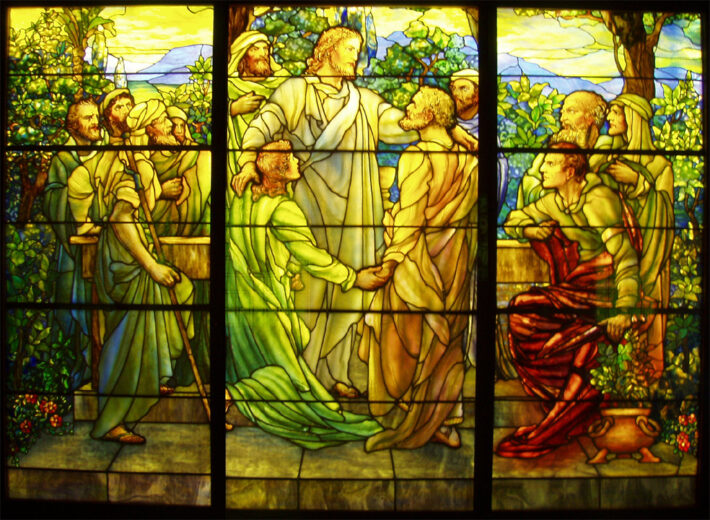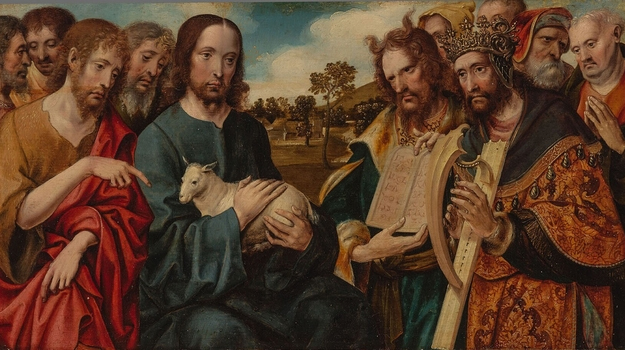Christian Art | Jesus’ Disciples Pluck Ears Of Corn | David And The Shewbread
Mark 2: 23-28 – Week 2 Ordinary Time, Tuesday (Audio Bible KJV, Spoken Word)
23 And it came to pass, that he went through the corn fields on the sabbath day; and his disciples began, as they went, to pluck the ears of corn.
24 And the Pharisees said unto him, Behold, why do they on the sabbath day that which is not lawful?
25 And he said unto them, Have ye never read what David did, when he had need, and was an hungred, he, and they that were with him?
26 How he went into the house of God in the days of Abiathar the high priest, and did eat the shewbread, which is not lawful to eat but for the priests, and gave also to them which were with him?
27 And he said unto them, The sabbath was made for man, and not man for the sabbath:
28 Therefore the Son of man is Lord also of the sabbath.
In today’s Gospel verses, Jesus teaches that the Pharisees have got it all wrong in relation to the Sabbath. While God gave the Sabbath to man as an opportunity to rest and to devote himself to divine worship, the Pharisees have choked the meaning of the Sabbath in a mass of legalese, turning it from being a time of joy into a time of anxiety and empty observance.
Jesus plucks the ears of corn because he and his disciples are hungry. It is good for Jesus to feed himself and his disciples, and so also to demonstrate that it is good for us to satisfy our basic, natural needs. By doing so, Jesus demonstrates his authority in interpreting the law, and in correcting the errors of the Pharisees.
Jesus recalls the actions of the great King David, reminding the Pharisees how he took the bread of the Presence, the twelve loafs placed each morning on the table in the sanctuary, to feed himself and his companions. The connection is made between the great historical king and the new and eternal king, Jesus. The Pharisees are asked to look again at the rules they have inherited, and which they seek to enforce. They are confronted with an overturning of their claim to authority. The Sabbath was made for man, and therefore Christ is Lord also of the Sabbath.
FRET not thyself because of evildoers, neither be thou envious against the workers of iniquity.
For they shall soon be cut down like the grass, and wither as the green herb.
Trust in the Lord, and do good; so shalt thou dwell in the land, and verily thou shalt be fed.
Delight thyself also in the Lord; and he shall give thee the desires of thine heart.
Commit thy way unto the Lord; trust also in him; and he shall bring it to pass.
And he shall bring forth thy righteousness as the light, and thy judgment as the noonday. (Psalm 37/36)
Concluding Prayer
True Light of the world, Lord Jesus Christ,
as you enlighten all men for their salvation,
give us grace, we pray,
to herald your coming
by preparing the ways of justice and of peace.
Who live and reign with the Father and the Holy Spirit,
God, for ever and ever.
Audio Bible KJV | Endnotes
Jesus Says That David Ate The Shewbread
Jesus uses the story of David and the shewbread to teach his disciples meanings of the Sabbath.
David, on the run from Saul, went into the house of God and ate the shewbread, which was reserved for the priests alone. This act, which would normally have been considered sacrilegious, was justified by David’s need for sustenance.
The story of David is rich in symbolism and raises questions about the nature of the Law.
Pharisees have accused Jesus and Jesus’ disciples of breaking the Sabbath by picking and eating grain on the Sabbath day. In response, Jesus reminds the Pharisees of the story of David. Jesus then declares that he is Lord of the Sabbath, and so says that he Jesus has authority to interpret and apply the Law as he sees fit.
The story of David and the shewbread has broader implications for understanding of the Law and its relationship to mercy. In the Bible, the Law is presented as a necessary but imperfect tool for governing human behavior. It provides a framework for justice and righteousness, but it cannot account for all the complexities of human life. In the case of David, the Law forbade him from eating the shewbread, but David’s need for sustenance and loyalty to God overruled the Law. This suggests that there are times when mercy and compassion must take precedence over legalistic adherence to the Law.
The story of David and the shewbread also has implications for our understanding of the priesthood and its role in mediating between God and humanity. In the Old Testament, priests were responsible for offering sacrifices and performing other religious duties on behalf of the people. The priests were intermediaries between God and humanity, and the priests had exclusive access to certain holy objects, such as the shewbread. David’s actions challenged this exclusive role, suggesting that God’s grace and mercy are available to all, regardless of their status or position.
Saint Augustine saw in David’s actions a foreshadowing of Christ’s sacrifice on the cross, which also involved a breaking of the law for the sake of mercy. Martin Luther emphasized the story’s implications for understanding the relationship between faith and works, arguing that David’s actions were an expression of his faith in God’s mercy.
Central to the story is tension between obedience to the Law and needs of the individual. The Law, given by God, is to guide and govern human behavior, but can be inflexible and harsh, and indeed without Jesus. David’s actions demonstrate the importance of balancing obedience to the law with compassion for those in need. In David’s case, the need for food outweighed the prohibition against eating the shewbread.
This tension between obedience to the law and needs of the individual is reflected in the New Testament. Jesus frequently challenged the legalism of the religious leaders of his day, arguing that love and compassion should be the guiding principles of human behavior. Jesus overturned established traditions and practices, such as the Sabbath laws, in order to prioritize the needs of individuals.
David’s actions have implications for our understanding of sin and redemption. David’s actions could be seen as sinful, as David broke the law and acted in a way that was not in keeping with the established religious practices of his day. However, David’s actions were also an expression of his loyalty to God and his trust in God’s mercy.
Jesus expresses a renewed relationship with God while teaching of David’s hunger and his – David’s eating the shrewbread.
The story of David and the shewbread challenges our understanding of the Law and its relationship to mercy. In the Old Testament, the Law was given as a framework for justice and righteousness. However, as Saint Thomas Aquinas wrote: ‘The Law was given to men, not as a bond of servitude, but as a guide to freedom.’ The Law was meant to be a tool for humans to use in their journey towards God, but it was not meant to be a burden or a barrier. David’s actions demonstrate the importance of balancing obedience to the Law with compassion for those in need.
Furthermore, the story challenges our understanding of the priesthood and its role in mediating between God and humanity. As the Catechism Of The Catholic Church explains: ‘Christ is the one mediator between God and man.’ The priesthood is meant to be a continuation of Christ’s ministry, not a replacement. David’s actions suggest that God’s grace and mercy are available to all, regardless of their status or position.
Saint Augustine saw in David’s actions a foreshadowing of Christ’s sacrifice on the cross, which also involved a breaking of the Law for the sake of mercy. Saint Augustine wrote: ‘The Lord Christ is both the David who ate the bread and the bread which he ate.’ Just as David broke the Law for the sake of his hunger, Christ broke the Law for the sake of humanity’s salvation.








